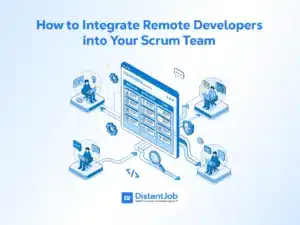Remote work and software development go together like tacos and guacamole or beer and pretzels. Even before C-19 changed the landscape, a big chunk of working from home was done by remote developers.
As study after study has proved, working from home increases productivity. It also means happier, healthier employees and lower costs for your company. But to maximize these benefits, you need engaged and motivated remote developers. Here are some tips on making that happen.
Onboarding Remote Developers
It’s a lot harder to ‘buy in’ to the company you work for if you’ve never been to the office. It’s also easier to feel isolated and disenchanted if you’re not made to feel like you belong. That’s why getting onboarding right is fundamental to successful remote working.
We’ve previously shared an in-depth guide to onboarding, but if you’re in a hurry, here’s the TL;DR:
- Making sure you have policies in place to set boundaries and support your remote worker – and that they have a login for the network!
- Set clear expectations for when and how you expect them to work
- Set up video call introductions with everyone you’d introduce them to if you were taking them on a tour of the office
- Make sure you include some social time in team meetings so you can all get to know each other
- Give them something to do – a real, self-contained project so they can learn the ropes before they’re let loose on anything sensitive.
There’s no need to make it complicated, just take your regular onboarding process and use remote communication tools to take it online.
Define Your Company Culture
Company Culture has become increasingly important in the past 10 years as first Millennials and then Generation Z became part of the workforce. Both sets of whippersnappers wanted to know that they were working for an organization that reflected their personal values as well as providing a paycheck.
Culture is important because it helps foster a sense of belonging, which is one of human beings’ fundamental needs. If you can clearly state who you are as a business and what you want to achieve, you will attract candidates who can really get behind your mission and make it happen.
You can bring your new hire up to speed with culture by making sure they understand what’s expected of them. Are you a flexible working company, or does the last one out at night have to make the coffee the next day? Do you encourage independent working in a mistake friendly environment, or is it your way or the highway?
One way to bring staff on board with company culture is a culture drop of branded goodies that reinforce who you are and what you do. Coffee mugs, mouse mats, tshirts; these are all gifts that help make your remote developer feel like they belong.
Encourage Learning
One area where remote staff have some concerns, is that they get overlooked for advancement; they can feel a bit ‘out of sight, out of mind’. That’s why it’s important that you make sure they get as much opportunity to learn and progress as their office-based counterparts.
This can mean taking online courses, getting a budget and time for reading or self-led learning, or booking them on a traditional training course in their area. And don’t overlook in-house training; screen sharing makes it possible for two team members on different sides of the world to work together, once the scheduling is worked out.
Make sure that your remote workers don’t get overlooked by anyone; not by HR, not by the company newsletter, and not by upper management. It’s your job as their manager to make sure the work they go gets acknowledged and they area considered as much a part of the company as anyone else.
Communication in Remote Teams
If there’s one thing you need to get right with remote work, it’s communication. If you don’t already have a communication policy, it’s time to create one. Get clarity on which channels your team uses, and what they use them for. Set expectations for how often you expect your team to check-in, and how they should be reporting their progress. Most teams use a selection of communication tools for different purposes such as:
- Video Conferencing
- Chat
- Task Management Software
- Version Control Software
- Daily standups/team meetings
- One-on-one calls
You will need to strike a balance between keeping your finger on the pulse of your team and micromanaging. Expect to change your communication strategy a few times until you find something that works well for you, but be willing to change that if your team member needs more or less contact.
Having Fun
As Jack Torrance taught us, all work and no play makes Jack a dull boy. You’ll probably have noticed a boost in performance from you office based team after you’ve had a social event, and that comes from the sense of team spirit that these occasions help to build.
While it’s not as easy to take the whole team bowling, you can still celebrate successes with your remote team, and find ways for the gang to hang out together online. This can be as simple as adding five minutes to the beginning and/or end of your meeting to shoot the breeze, all the way up to organizing a retreat in Bali. There is plenty of middle ground to be found in virtual coffee breaks, online gaming, or watch parties with pizza.
It’s About Relationships
Fundamentally, having an engaged remote developer is all about taking the time to build a relationship with them in spite of the distance; and all relationships need trust. One of the best ways to ensure trust is to be 100% confident in your hiring decision.
That’s where we come in. We’re a remote technical recruitment agency; we specialize in matching companies like yours with the best developers around the world. Give us your job description, and we’ll give you a shortlist of qualified and remote-ready candidates.




